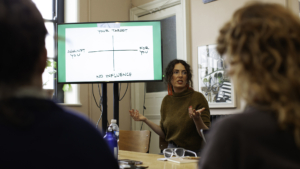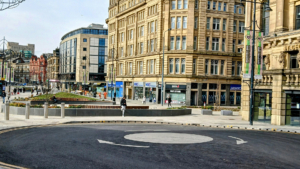Preparing, adjusting and planning ahead
The Leading Resilience programme addresses the cultural sector’s need to build resilience to unavoidable climate and environmental changes. There are three activity strands:
– Adapting Culture, open to portfolio organisations and the wider sector
– Resilient Horizons, currently provided to participants in the Creative People and Places programme
– Adaptive Futures: Bradford, two free JB programmes (from Jan 2026) connecting Bradford’s creatives and communities to explore culture, climate and collective action.
Current Opportunity
Creative Climate Accelerator: Bradford (2026) – CCA Bradford supports nominated participants to develop climate-focused creative projects with organisational backing and tailored guidance. Applications are open until 9 December 2025. Find out more.
Programme resourcesWhy should culture adapt to current and future climate change?
In the UK we’re already experiencing climate change. It is affecting our infrastructure, health, food security, and ecosystems – and those least responsible for emissions suffer the most. Cultural organisations have the opportunity to make meaningful change to how we live, work, and relate to each other.
The cultural community needs to consider how to adapt while preserving and caring for our buildings, stories, and cultural heritage. By using culture’s unique power to build connection and empathy, we can find creative and collaborative approaches to society’s challenges. We can make positive changes that prioritise justice, connection, and wellbeing to create a fairer, more resilient future for everyone.
Adapting Culture
To build a sustainable and future-focused cultural sector, we must adapt to the changes that will come as the climate warms. The pathway to this is through ‘adaptation’. This can be defined as ‘actions to reduce vulnerability to the current and expected impacts of climate change’, such as heatwaves, flooding, and sea-level rise. These impacts threaten cultural buildings, their audiences and communities. This makes adaptation crucial for both protecting and transforming the cultural economy – both physical structures and the people who define these spaces.
-
Our Adapting Culture workshops and webinars enable participants to build awareness and understanding of climate change adaptation, focusing on actions at individual, organisational, and governance levels.
We will explore how we might adapt our buildings and venues, operations and infrastructure, policies and strategies. Through workshops and peer sharing sessions we’ll look at interconnections between climate resilience, nature and place-making, and the role of culture in shaping and transforming communities and places.
Other free Arts Council England programmes that include sessions on strategies for adaptation include:
- Transforming Energy – an emissions reduction programme for building-based organisations
- Board Environmental Champions – exploring adaptation and resilience at governance level
-
Cultural organisations and independent creative practitioners who would like to join workshops on adaptation can register interest here to join the programme.
The programme is open to portfolio organisations and the wider sector.

Resilient Horizons
Adapting to climate change needs locally-led solutions, tailored to communities. By focusing on the specific contexts of people and places, we can address the root causes of vulnerability. We must value each community’s diverse experience, skills and knowledge to empower those most affected.
Through Resilient Horizons, we are collaborating with grassroots cultural organisations from Arts Council England’s Creative People and Places programme (CPP) to explore how creativity can connect with, and deepen understanding of, local contexts. We are co-creating adaptation responses with communities to make positive changes towards creating more resilient places in a changing climate.
-
We are working with organisations participating in the Creative People and Places programme that are already addressing climate-related issues in towns, cities, and rural areas facing socioeconomic and health inequalities. Projects are building skills in in food growing, gardening, and designing accessible green spaces.
New organisations cannot join the Resilient Horizons programme, but we will share knowledge gained and examples of initiatives that organisations can apply to their own adaptation plans. This includes:
- Useful resources to share with the sector
- Blogs, case study and best-practice examples
- Tools to inspire cultural organisations’ own responses to climate impacts they may face in their locality.
Visit our adaptation resources page, and sign up to our newsletter so you are notified when content becomes available.
Adaptive Futures: Bradford

-
The future could be more than just sustainable: it could be bold, transformative and made by us. When local people and creatives come together, new visions and plans can be made, supporting Bradford’s communities to build agency, thrive together and adapt to a changing climate.
As the City of Culture year flows into its next chapter, we’re building on the momentum of powerful, previous projects in this space – from Bradford Ark and the Storm Cycle events to Jungle Book Reimagined by Akram Khan Company. Now we’re gathering ideas, energy and care to deepen action in the heart of Bradford’s communities.
From January 2026, two free programmes led by Julie’s Bicycle (JB), will focus on Bradford’s unique culture and environment, offering space to connect, learn, workshop and create responses to the challenges (and possibilities) of our shared future.
We’re reaching out to people across the creative, community, and third sectors – anyone using creativity to connect, engage and imagine change.
Find out more
Get in touch
We are looking for creative examples of climate adaptation responses. If you are a cultural organisation, artist, or network leading, exploring or testing out ideas in this area we are keen to build relationships with you. We would be delighted to share your work, whether it is in your operations, buildings, events, or community.
If you would like to develop a case study with us to share knowledge / best-practice with peers, or share any relevant events, talks, or programmes you are involved in our networks and on our social channels please contact us.
Arts Council England Programme
Find out moreResources Hub
Find out more